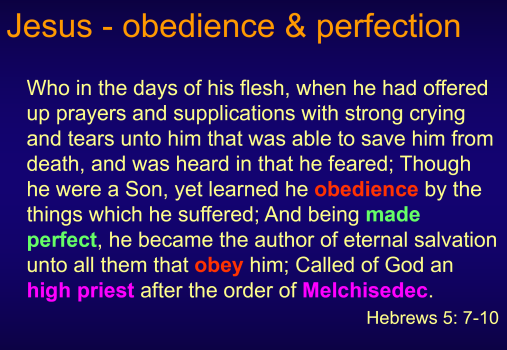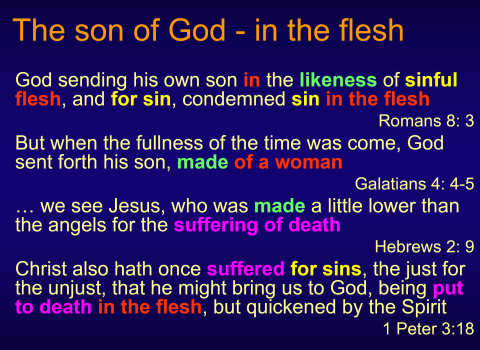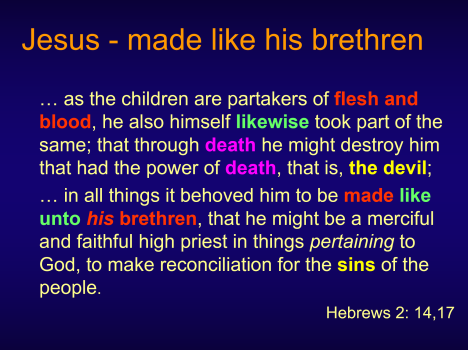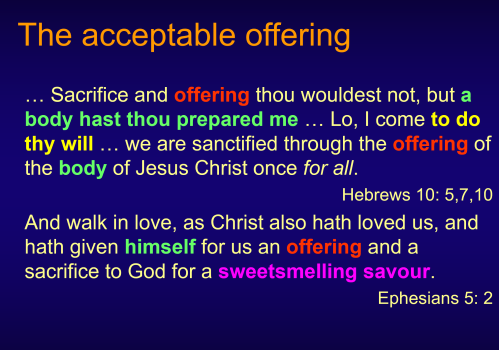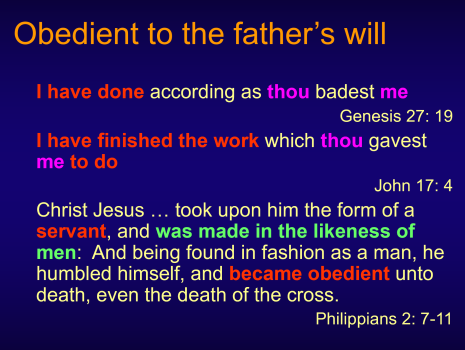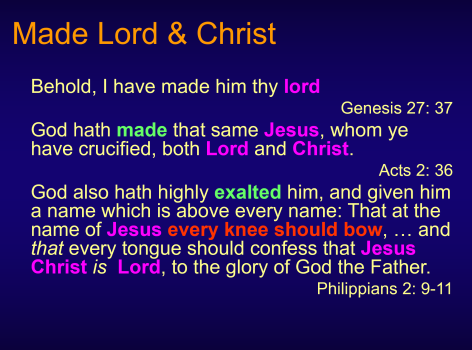Look at the allegory Paul shows between the bondwomans son and the freewomans, one corresponds to the Jerusalem that then was.
Paul asks,
Gal 4:21 Tell me,
ye that desire to be under the law,
do ye not hear the law?
Gal 4:22 For it is written,
that Abraham had two sons, the one
by a bondmaid, the other
by a freewoman.
Gal 4:23 But
he who was of the bondwoman
was born after the flesh; but
he of the freewoman was by promise.
The law tells us by these two which one is born after the flesh (for example, Ishmael, the seed of Abraham according to the flesh) verses Isaac (who was son of promise)
Gal 4:24
Which things are an allegory: for t
hese are the two covenants; the
one from the mount Sinai, which
gendereth to bondage, which is Agar.
Hagar represents a covenant, as the bondwoman
Gal 4:25 For
this Agar is mount Sinai in Arabia, and
answereth to Jerusalem which now is, and
is in bondage with her children.
Which is not the Jerusalem which is above
Gal 4:26 But Jerusalem
which is above is free,
which is the mother of us all.
Again this way,
Gal 4:22 For it is written,
that Abraham had two sons, the one
by a bondmaid, the other
by a freewoman. (Romans 9:7)
Gal 4:23 But
he who was of the bondwoman
was born after the flesh; but
he of the freewoman was
by promise.
Paul says,
Gal 4:28
Now we, brethren, as Isaac was, are the children of promise.
Likewise the same which pertains to the Spirit
And, behold, I send the promise of my Father upon you |
|
Gal 4:29 But
as then he that was born after the flesh
persecuted him
that was born after the Spirit,
even so it is now. (John 15:20)
Gal 4:30
Nevertheless what saith the scripture?
Cast out the bondwoman and her son: for
the son of the bondwoman shall not be heir with the son of the freewoman.
Paul also says of these here,
Gal 11:15 For
if the casting away of them
be the reconciling of the world,
what shall the receiving of them be,
but life from the dead?
And of the son of the bondwoman (because he was Abraham's seed according to the flesh) God says, he would be made "a" nation"
Gen 21:13 And also
of the son of the bondwoman will I make
a nation,
because he is thy seed.
The heir,
Romans 4:13 For the promise,
that he should be the heir of the world,
was not to Abraham,
or to his seed,
through the law,
but through the righteousness of faith.
Abraham and his seed, is Christ
Gal 3:16
Now to Abraham
and his seed
were the promises made.
He saith not,
And to seeds, as
of many; but
as of one, And
to thy seed, which is Christ.
And if you belong to Christ it says,
Gal 3:29 And
if ye be Christ's, then
are ye Abraham's seed,
and heirs according to the promise. (Gal 4:29, Romans 8:9)
There is also Abraham's seed after the flesh (born the ordinary way) by Hagar (a covenant) which gendreth bondage, not the son by promise, but according to the flesh
As shown here
John 8:33 They answered him,
We be Abraham's seed, and were never in bondage to any man: how sayest thou, Ye shall be made free? (Jesus acknowledged they are Abraham's seed in John 8:37) which is according to the flesh.
They were looking at being in bondage as to being in bondage to any man (rather than to sin)
John 8:34 Jesus answered them,
Verily, verily, I say unto you, Whosoever committeth sin is the servant of sin.
As Paul says,
Gal 4:23 But
he who was of the bondwoman
was born after the flesh...
Gal 4:23
the one from the mount Sinai,
which gendereth to bondage, which is Agar.
Gal 4:25 For
this Agar is mount Sinai in Arabia,
and answereth to Jerusalem which now is, and
is in bondage with her children.
Again, how they were perceiving Jesus speaking of bondage (being Abraham's seed after the flesh)
John 8:33 They answered him,
We be Abraham's seed, and were never in bondage to any man: how sayest thou, Ye shall be made free?
Christ is Abraham's seed (the only begotten/ son of promise/singular) and these also be Abraham's seed (according to the flesh/many) Jesus acknowledges
John 8:37 I
know that ye are Abraham's seed; but
ye seek to kill me,
because my word hath no place in you.
As Christ is Abraham's seed (to whom the promises are made)
Gal 4:29 But
as then he that
was born after the flesh
persecuted him
that was born after the Spirit,
even so it is now. (John 15:20)
As Jesus said, If they
have persecuted me,
they will also persecute you
Again as Paul shows it
Romans 9:7 Neither,
because they are the seed of Abraham,
are they all children:
but, In Isaac shall
thy seed be called.
He further clarifies
Roman 9:8
That is, They
which are the children of the flesh,
these are not the children of God:
but the children of the promise are
counted for the seed.
Those who have the Spirit of Christ are counted the children of promise
Gal 4:28
Now we, brethren, as Isaac was,
are the children of promise.
Romans 8:9 ...Now if any man
have not the Spirit of Christ, he is none of his.
Just roll it around they will show the pattern and consistency between these verses.
Not an answer to my question. Figures, right
@face2face?
You said,
Agreed. Except the Bible is not a dictionary defining words.
Me
Where did I use the bible to define the words, I gave the concordance number and compared between only begotten in the NT as well to only son in the OT in Isaac and both are adjectives that describe a uniquely born son, of which both were, not to mention the scriptural comparisons also.
You said
Why can’t there be an imperfect analogy between Isaac and Jesus?
Me,
Not sure what you are asking, we see things impefectly, so maybe we put them imperfectly?
You said,
Most analogies break down at some point in the analysis. For instance, who is Ismael’s counterpart to Jesus?
Me
You mean most of the LORD's similitudes he spake by using the prophets or man's?
You
For instance, who is Ismael’s counterpart to Jesus?
Me
If Isaac represents Jesus Christ in a similitude in Abraham, he would be the one seed, the other would include all other outside of him as the one but who were fathered by Abraham (children born after the flesh). According to the allegory which show the women as two covenants.


